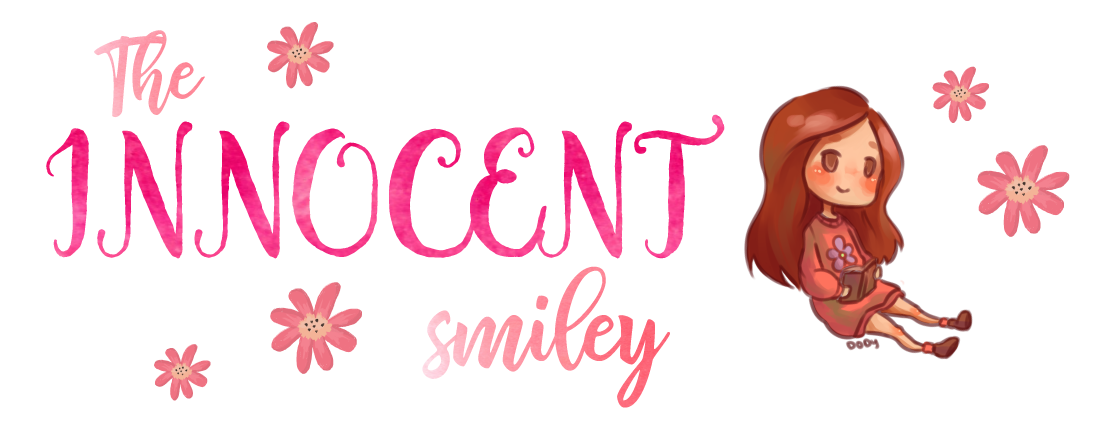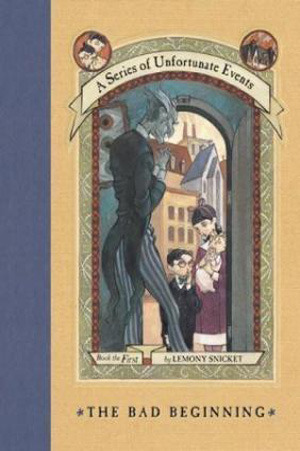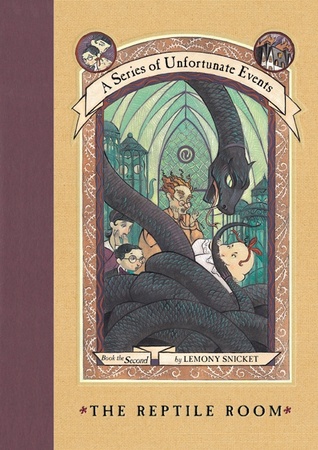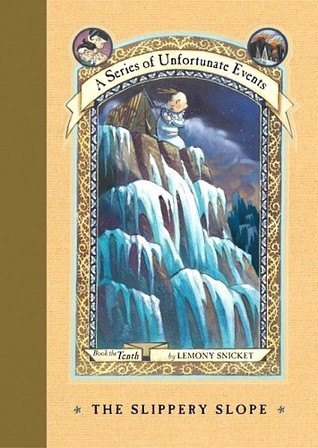A Series of Unfortunate Events
Number of Books: 13
Publisher: HarperCollins
Release Date of First Book: September 30th, 1999
Release Date of Last Book: October 13th, 2006
The executor of the Baudelaire estate -- a phlegm-plagued banker named Mr. Poe - sends the children to live with a distant relative: a conniving and dastardly villain named Count Olaf, who has designs on the Baudelaire fortune. Count Olaf uses the children as slave labor, provides horrid accommodations for them, and makes them cook huge meals for him and his acting troupe, a bunch of odd-looking, renegade good-for-nothings. When the children are commandeered to appear in Count Olaf's new play, they grow suspicious and soon learn that the play is not the innocent performance it seems but rather a scheme cooked up by Olaf to help him gain control of the children's millions.
All this bad luck does provide for both great fun and great learning opportunities, however. Violet is a budding McGyver whose inventions help the children in their quest, Klaus possesses a great deal of book smarts, and Sunny -- whose only real ability is an incredibly strong bite -- provides moral support and frequent comedy relief. Then there are the many amusing word definitions, colloquialisms, clichés, hackneyed phrases, and other snippets of language provided by the narrator (a character in his own right) that can't help but expand readers' vocabularies. Though the Baudelaire children suffer myriad hardships and setbacks, in the end they do manage to outsmart and expose Olaf's devious ways. But of course, with luck like theirs, it's a given that Olaf will escape and return to torment them again some day. If only misery was always this much fun.
Goodreads | Amazon | B&N | Book Depository
When I was little, my school's library had the Series of Unfortunate Events series, but they had two red dots on their spines. One read dot meant that you had to be at least in sixth grade to check it out, and two red dots meant that only eighth graders could check it out. However, by the time I reached sixth grade, I realized that the local public library had no such age restrictions and read the entire series within a month. I thoroughly enjoyed the series, but I didn't quite understand why the series was restricted to the older kids. Yes, it was a bit sad at times, but nothing my little eleven year old self couldn't endure.
However, having read it for the second time--this time at twenty years old, I can wisely say that my eleven year old self was dead wrong. I don't know what I missed as a kid but these books are SO FRICKING DEPRESSING. For example, the series opens with the Violet, Klaus, and Sunny Baudelaire's lovely day at the beach being interrupted by the news that their house burnt down in a fire that also claimed the lives of their parents. Did I mention that their respective ages are 14, 12, and under 1?
Anyways, after getting this news the orphans are placed in the custody of Count Olaf, who is their "third cousin four times removed or fourth cousin three times removed" according to Mr. Poe, the incompetent banker in charge of the Baudelaire fortune until Violet turns eighteen. However, after spending some time at his filthy mansion, the orphans discover that Olaf is only after their fortune. I really don't want to give too many spoilers away in this reviews, but the Baudelaires are able to stop his scheme and placed in the custody of another guardian. But Olaf is not so easily assuaged and hunts them down and comes up with a scheme to once again steal their fortune. And this is pretty much the formula for the first few books: orphans arrive in custody of an eccentric new guardian, things are relatively okay (sometimes not) as they adjust, Olaf shows up and causes trouble and/or deaths, then the kids are shipped off to another home.
While this formula is quite obvious for the first seven books, it doesn't get tiring at all. Each new guardian is more absurd and quirky than the last. In the third book, The Wide Window, they are put under the care of their Aunt Josephine who is cripplingly afraid of everything. For example, the kids can't even turn on a stove to heat up food because she's terrified it might result in the house burning down. But outside of those, she is truly a loving guardian. They spend the fifth book, The Austere Academy, at a boarding school that has teachers who give the Baudelaire's a hard time because their orphans and where Sunny (the baby) is forced to become a secretary for the principal. However, while there they meet another set of orphans, the Quigley's who become very important as more secrets are discovered in the series. The Vile Village takes the saying "It takes a village to raise a child" proverb literally and the orphans spend the seventh book in the legal care of an entire (and quite strange) village.
The ending of The Vile Village also drastically changes the tone and direction for the remaining books of the series. The Baudelaire orphans are framed for a crime that they did not commit and must spend the remaining books on the run as they try to discover more about the mysterious V.F.D-- a secret organization of which many characters they encounter (and their late parents) are members. There are so many questions that are raised in the second half of the book such as: what is the connection between the Quigley's and the Baudelaires? Why does Count Olaf harbor such a deep grudge against the Baudelaires? What exactly is V.F.D and what happened to it? What is the sugar bowl and why is it so damn important? And many, many other questions since the second half of the series isn't just about the Baudelaires but is also about V.F.D and the other characters they encounter.
| Their motto and symbol |
However I'm sad to report that not all these questions get answered. The Baudelaire's chapter of the story get full closure (for the most part), but the larger story of which they only play a part, doesn't really get answered. And while reading, it's clear that it's not a result of laziness on the part of the author--he knows everything, but just isn't telling. It is a bit frustrating having all these questions that never will get answered, but I promise you this series is still worth a read. So I guess I'll talk about the things this series does right.
One aspect of the series that I appreciated a lot as an adult was the moral ambiguity. In the beginning, good and evil is as defined as black and white--which was something that I expected of a children's book. However as the series goes on, determining who or what is good and bad is not as simple anymore. Especially since the Baudelaires are forced to do things that are clearly quite horrible (especially in The Penultimate Peril--Book 11 >.<), but they are still good kids and those things were only done in order to protect themselves. A character in the tenth book, The Grim Grotto, says it the best:
People aren't either wicked or noble. They're like chef's salad, with good things and bad things chopped and mixed together in a vinaigrette of confusion and conflict
In addition, Lemony Snicket is the best narrator--his writing style is so unique and mature that you won't even feel like you're reading a children's book. He spends a good amount of each book urging you not to read it because of how depressing the subject matter is and has the best sense of dry humor. I guess the best way to say it is that he doesn't seem to care what he does, but that's not quite getting at it, so I'll try giving some examples. In the sixth book, The Eratz Elevator, there a a few pages that are just black, in order to show just how dark the environment was for the orphans at that point in the book.
| Who cares about saving trees anyways. |
There is a point The Bad Beginning when Klaus, the bookworm up late at night reading a book, and Lemony Snicket writes this.
The book was long, and difficult to read, and Klaus became more and more tired as the night wore on. Occasionally his eyes would close. He found himself reading the same sentence over and over. He found himself reading the same sentence over and over. He found himself reading the same sentence over and over.
And, my personal favorite (which technically is not from the Series of Unfortunate Events series, but it's still amazing)
If writers wrote as carelessly as some people talk, then adhasdh asdglaseuyt[bn[ pasdlgkhasdfasdf. ~Horseradish
However, in addition to writing ridiculous sentences like these he also manages to write some of the most true things that I have ever read
“The way sadness works is one of the strange riddles of the world. If you are stricken with a great sadness, you may feel as if you have been set aflame, not only because of the enormous pain, but also because your sadness may spread over your life, like smoke from an enormous fire. You might find it difficult to see anything but your own sadness, the way smoke can cover a landscape so that all anyone can see is black. You may find that if someone pours water all over you, you are damp and distracted, but not cured of your sadness, the way a fire department can douse a fire but never recover what has been burnt down.” ~The Bad Beginning
So this post is already much longer than normal so I'm going to cut myself off here, but let it be said that I have not even covered half of what makes this series so amazing for me. There is so much more about the plot that could be said, so many unique characters that I've fallen in love with, and so many quotes that I am dying to share with you. However, I shall cut myself here in hopes that you will take it upon your self to read this wonderful series, I can promise you that you will not regret it.
 Vanessa is Val's bestest buddy, and she will be guest posting throughout the summer because she loves to read and write. You can also find her at her own blog, Musings of an Aspiring Writer.
Vanessa is Val's bestest buddy, and she will be guest posting throughout the summer because she loves to read and write. You can also find her at her own blog, Musings of an Aspiring Writer.




